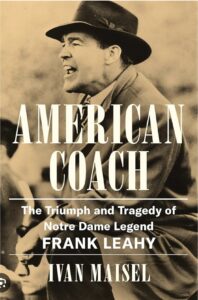Paul O’Connor, a proud Notre Dame alum and fan of the Fighting Irish, takes a look at a new biography of one of Notre Dame’s most successful and storied football coaches. The saga takes readers into the tensions between football and academics at a great university in the 1940s and ’50s, and it describes developments that helped shaped college football as we know it today.
Reviewed by Paul T. O’Connor
AMERICAN COACH: THE TRIUMPH AND TRAGEDY OF NOTRE DAME LEGEND FRANK LEAHY. By Ivan Maisel. Grand Central Publishing. Hardcover. 400 pages. $30, hardcover. Audiobook read by LJ Gasner. 13 hours, 45 minutes.

When the Rev. Edward Sorin of the Congregation of Holy Cross founded the University of Notre Dame, my alma mater, in 1842, he envisioned it as an institution known for the good it did for the world.
One hundred years later, the world knew Notre Dame for its football team, a sport that had not been invented when the French priest purchased 1,250 acres of northern Indiana farmland for his grand vision.
In the first half of the 20th century, it was football success that had distinguished Notre Dame from the nation’s other Catholic universities, making it the unrivaled institution of American Catholicism. To many, Notre Dame was a football school first, and an academic institution second.
Priests of the Congregation of Holy Cross see their worldly mission, as do Jesuits and priests of other orders, as education, and by the late 1940s they were ready to reclaim educational excellence as the image for the flagship of Holy Cross’s network of colleges.
Ironically, the university’s best-known employee stood in their way. Frank Leahy, class of 1931, was widely considered the best football coach of his era and maybe of all time, maybe greater even than Knute Rockne, who built the Notre Dame juggernaut. Leahy wanted to win, and he fought relentlessly to maintain the team’s resources.
The Rev. John Cavanaugh began the process of de-emphasizing football at Notre Dame, but the major effort came during the presidency of the Rev. Theodore Hesburgh, who assumed the office at age 35 in 1952. He and Leahy, who had clashed since Hesburgh joined in the administration, entered a struggle that ended in Leahy’s departure in 1954 and Hesburgh’s leading the university to the academic heights it occupies today.
Ivan Maisel, a veteran sportswriter, Alabama native and Stanford graduate, has written a biography of Leahy that in my mind stands beside Robert Creamer’s The Babe at the top of the sports biography genre. I can honestly say that had Maisel written a biography this comprehensive about a coach from the University of Southern California or the University of Michigan, I would have enjoyed it almost as much. (Of course, I would have most loved the chapters in which the Irish buried either of these two hated rivals.)
Leahy was obsessed with winning, no life/work balance for him. Time and again, he drove himself to exhaustion preparing for football games. He wore himself out so thoroughly that he was ordered to bed for rest during several seasons and once was administered the last rites of the church after he collapsed in the locker room at halftime of a big game.
His serious demeanor turned off many other coaches and sportswriters, and he was never popular among his peers, quite possibly because he had no peers. Only late in life, after he had retired, was he voted into the College Football Hall of Fame by the very coaches he had whipped on the field.
To me, the greatness of this book arises first from the thorough examination of the tension at Notre Dame between football and academics, a tension that led to Lou Holtz leaving in 1996, and (thank God!) Brian Kelly leaving in 2021.
To non-Notre Dame fans, the value of this book, however, is in examining the role and place of college football in this country from 1927 to 1954, including the war years. This is the birth story of a monster that has led to what college football has become today.
And there is plenty for those who despise Notre Dame. Maisel bluntly describes Leahy’s shortcomings and Notre Dame’s advantages, especially in the post-World War II era. He even discusses a few venial sins Hesburgh may have committed.
Take my word for it, anyone interested in football, even Trojans, Wolverines and graduates of other schools, will enjoy this splendid biography.